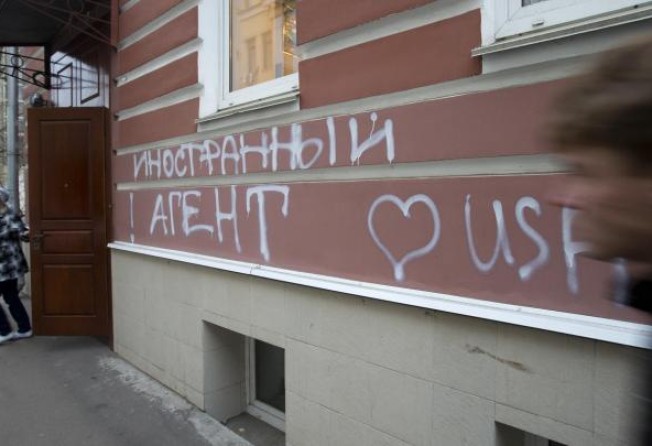Right groups in Russia to oppose 'foreign agent' law
Groups funded from outside Russia will contest penalties stemming from new act in the courts, as Moscow clamps down on rights advocates

Workers at the Russian human rights organisation Memorial arrived at work to see a phrase spray-painted across their office building: "Foreign Agent."
Anonymous vandals scrawled the same words in giant, sloppy white letters across the door of For Human Rights, which represents citizens in disputes with police or prosecutors.
The phrase, which to Russians evokes treachery and cold war espionage, was repeated many times on Wednesday, when a new law came into force requiring charity groups that receive financing from outside Russia to identify themselves as "foreign agents".
The law was hurriedly passed two months after the inauguration of President Vladimir Putin, who has accused foreign governments of provoking the large anti-Kremlin demonstrations that began last winter.
The new law has been accompanied by other measures discouraging interaction with foreigners, such as expanding the legal definition of treason to include "providing financial, technical, advisory or other assistance to a foreign state or international organisation".
Groups such as Memorial and For Human Rights have decided to defy the law, despite the threat of fines, being closed down, or, if prosecutors choose to pursue a criminal charge, a prison sentence of up to two years.
Oleg Orlov, Memorial's chairman, said accepting the "foreign agent" label would so undermine public trust that rights advocates would no longer be able to carry out work like monitoring prison conditions or researching disappearances in the restive North Caucasus.
"A foreign agent equals a traitor, a betrayer of the homeland," he said. Groups that comply, he added, "will be outcasts in this society".
"They will be branded. The public will look at them with suspicion, and officials will simply refuse to associate with them."
It is unclear how the Russian authorities will enforce the vaguely worded law, which will be overseen by Russia's Justice Ministry.
The requirement applies only to organisations engaged in "political activities", like trying to influence public opinion or advocating to change policy.
Groups said they were poised to contest any penalties through the courts, in part to test the constitutionality of the new law.
"We will risk a fine, and it's possible that a question of a criminal charge will arise," said Pavel Chikov, who heads a legal organisation, Agora. "But if we are forced to choose between ceasing our work and risking a criminal investigation, I will choose the latter."
Government authorities spoke approvingly of the new law, saying foreign money must be excluded from politics to defend Russia's sovereignty.
Western-financed programmes proliferated in the 1990s, when Russia's economy and political system were in a shambles and foreign governments hoped to help guide the development of a post-Soviet state. Putin intends to uproot the vestiges of those projects.